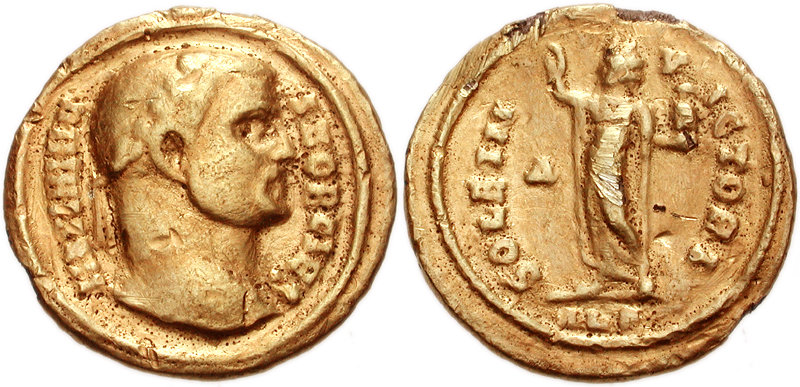Of Glitter & Gold: Tolkien v. Shakespeare
“All that glitters is not gold”. It’s a well-known aphorism in the English language. The origins of this phrase are apparently quite old, dating back to the 12th century when a French theologian, Alain de Lille, said: “Do not hold everything gold that shines like gold.” The phrase appears in many other works, including The Cantebury Tales, by Geoffrey Chaucer* and Don Quixote by Miguel de Cervantes.** The most famous use of this phrase is from Shakespeare’s Merchant of Venice (Act II, Scene VII – Prince of Morocco).
 |
| Top: Maximinus II (305-309 AD) Bottom: Severina (270-275 AD) |
Shakespeare would say buyer beware. You’re prone to be duped–as with a shiny fouree that is, in reality, a worthless bronze fake dipped in a thin layer of gold. It’s good enough advice. As anyone that has bought fine jewelry from a flea market can attest, just because something looks valuable, doesn’t make it so. There are powerful subliminal forces at play in the human brain that make us prone to conclude that shiny, glistening or fancy equals valuable. We are even more likely to pounce if we think we’re getting a great deal.
The insights of Shakespeare et al notwithstanding, I find J R R Tolkien’s twist on this common aphorism even more fascinating. As we meet Strider in The Fellowship of the Ring, Tolkien foreshadows a greatness that is not apparent in his outward appearance.
| The Corbridge hoard and jug, 160 AD Corbridge, Northumberland, U.K. British Museum, London (another Big Reid iPhone photo) Another coin hoard photo! These 160 gold coins were kept in a jug with 2 bronze coins wedged in the neck to conceal them. The jug was buried under the floor of a Roman house. The weight of the gold broke the bottom out of the jug when it was lifted, revealing the gold. A great day for an archaeologist just got better. |
At first blush, Shakespeare and Tolkien seem to be saying the same thing. Yet I see fundamental differences. Fail to see the truth in Shakespeare’s wisdom and we are vulnerable as we place value on something that is worthless. This costs us in terms of time, money and a wasted effort in the pursuit of a counterfeit. Failure to see the truth in Tolkien, and we devalue that which is of great worth. It is far more tragic to pass by something of inestimable value that we fail to recognize because of it’s plain exterior. This is like dismissing a corroded old jug stuffed with gold that is concealed by an ordinary bronze coin.
What is so profound about Tolkien’s perspective is that’s it’s talking about people, rather than things. When the Lord chose David from amongst the sons of Jesse, he taught Samuel this very principle:
“for the Lord seeth not as man seeth; for man looketh on the outward appearance, but the Lord looketh on the heart.” (1 Samuel 16:7)
Imagine if we could look at ourselves and others and see gold where nothing glitters–if we could see not what man sees, but what God sees.***
____________________
* Chaucer: “But everything that glisters like fine gold is not gold, as I’ve often heard it told; and every apple that is fair to eye is yet not sound whatever hucksters cry.” [The Canon’s Yeoman’s Tale (Chapter 49:243-246)]. It seems likely that Shakespeare was expounding on Chaucer given the similarity of the quotes.
** Cervantes: “All the glitters is not gold” [Part II Chapter XXXIII] and “All is not gold that glitters” [Part II Chapter XLVIII].
*** See the October 2012 talk by President Thomas S. Monson on this topic here.

One thought on “Of Glitter & Gold: Tolkien v. Shakespeare”
I keep passing your address on to others – this is why. Thanks again.
Comments are closed.